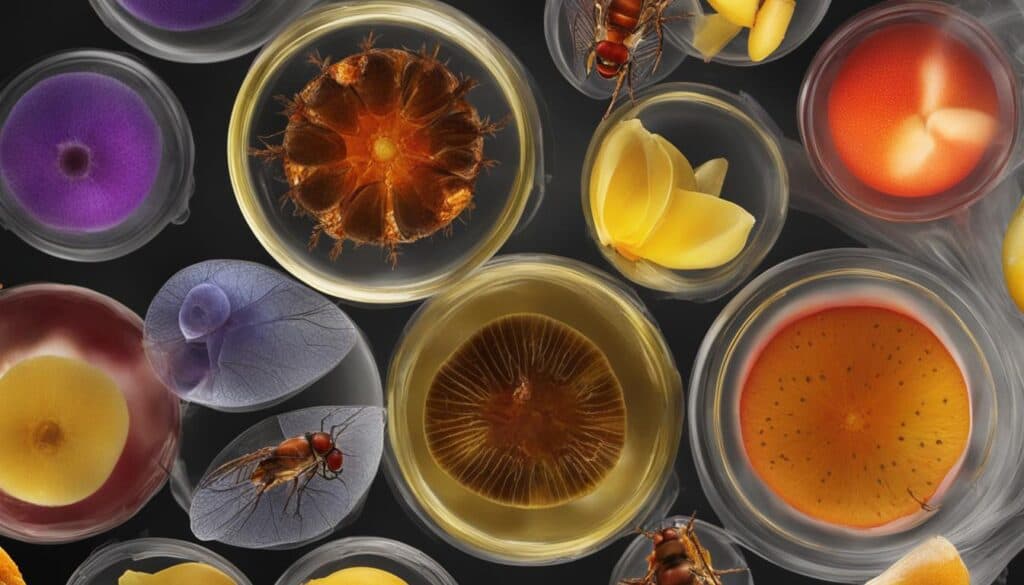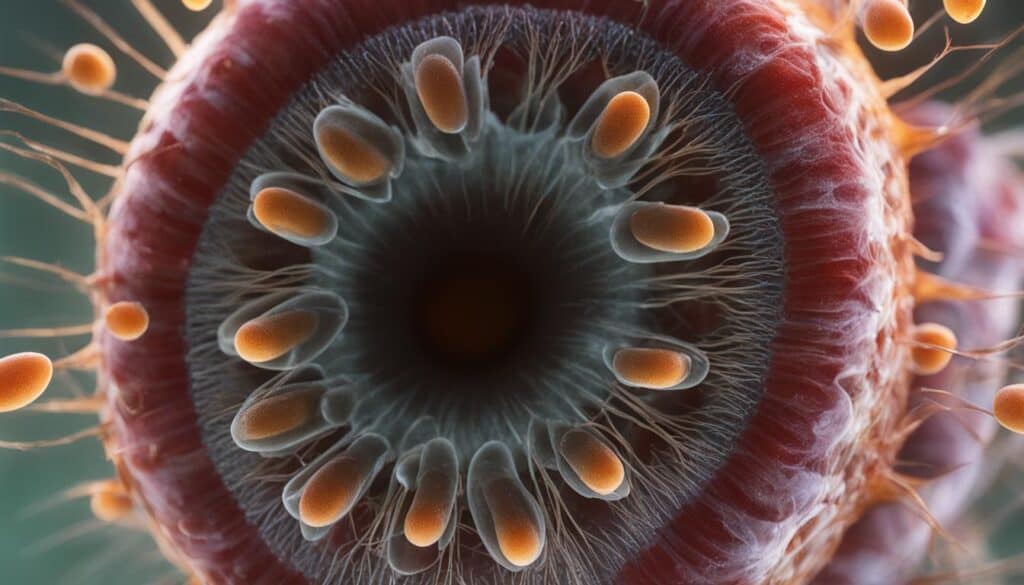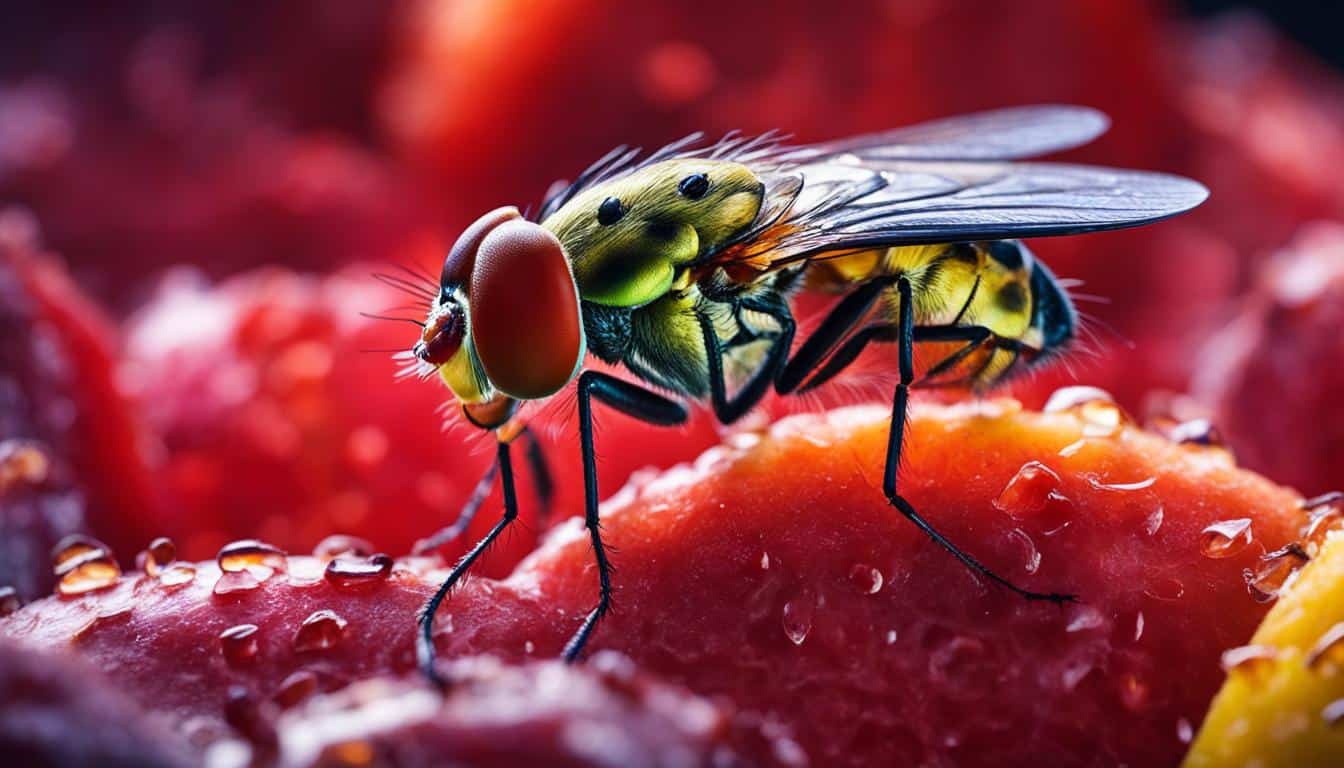Fruit flies are not just annoying pests, they can also pose health risks. They are attracted to ripe and rotting food, especially fruits and vegetables such as bananas, melons, tomatoes, squash, and apples. An adult female fruit fly can lay up to 2,000 eggs on moist and rotting surfaces, and within 30 hours, tiny maggots will hatch and start feeding on the decaying food.
Fruit flies have been found to carry bacteria such as salmonella, E. coli, and listeria, which can cause food poisoning and potentially life-threatening infections. Insect sprays may kill adult fruit flies, but thorough sanitation and traps are necessary to eliminate them completely.
Key Takeaways:
- Fruit flies are attracted to ripe and rotting fruits and vegetables.
- Fruit flies can lay up to 2,000 eggs on moist and rotting surfaces.
- Fruit flies can carry bacteria such as salmonella, E. coli, and listeria.
- Insect sprays are not enough to eliminate fruit flies; thorough sanitation and traps are necessary.
- Proper sanitation and control measures can help prevent fruit fly infestations and reduce health risks.
How Can You Identify Fruit Flies?
Fruit flies, scientifically known as Drosophila melanogaster or vinegar flies, are small insects measuring about 1/8 inch long. They have bright red eyes, a light yellowish-brown to dark brown cylindrical body, and long, hairy antennae. Fruit flies can be found not only on decaying fruits and vegetables but also on dirty tables, kitchen utensils with food residues, sponges, rags, and fermenting liquids like vinegar, fruit juice, wine, and beer.
“Fruit flies, scientifically known as ‘Drosophila melanogaster’ or vinegar flies, are small insects measuring about 1/8 inch long.”
To identify fruit flies, look for their distinctive characteristics:
- Bright red eyes
- Light yellowish-brown to dark brown cylindrical body
- Long, hairy antennae
Fruit flies are commonly attracted to decaying organic matter and fermenting liquids, making them a nuisance in homes and commercial kitchens. Identifying these small insects is crucial for implementing effective control measures and maintaining proper hygiene.
How Can You Identify Fruit Flies?
Life Cycle of Fruit Flies
Fruit flies undergo a fascinating life cycle consisting of four distinct stages: eggs, larvae, pupae, and adult flies. Understanding this life cycle is crucial for effectively managing and eliminating fruit fly infestations in your home.
Eggs:
Fruit flies typically lay their eggs on the surface of decaying organic matter, such as fruits or vegetables. These eggs are very small and barely visible to the naked eye. Within 24 hours, the eggs hatch into larvae, also known as maggots, which are the feeding stage of the fruit fly life cycle.
Larvae:
The larvae or maggots are usually white or cream-colored and measure about 2.5 to 4.5 mm in length. They emerge from the eggs and immediately begin feeding on the decaying matter. During this stage, the larvae molt several times, growing in size as they consume the organic material.
Pupae and Adult Flies:
After feeding and growing for several days, the larvae move to a cooler location, such as under soil or in cracks and crevices, to pupate. During the pupal stage, the larvae transform into adult flies inside a protective cocoon. This process takes about 6 days. Once fully developed, the mature adult fruit flies emerge from the cocoon, ready to mate and continue the life cycle.

Understanding the life cycle of fruit flies is essential for effective control and prevention measures. By breaking the life cycle at any stage, you can significantly reduce the population and prevent future infestations.
| Stage | Description |
|---|---|
| Eggs | Small, barely visible; laid on decaying organic matter |
| Larvae (Maggots) | White or cream-colored; feed on decaying matter |
| Pupae | Formed inside a cocoon; transformation to adult flies |
| Adult Flies | Mature fruit flies ready to mate and continue the life cycle |
The complete fruit fly life cycle typically lasts around three weeks, but it can vary depending on environmental conditions such as temperature and food availability. By disrupting and eliminating any stage of the life cycle, you can effectively control and prevent fruit fly infestations in your home.
Can Fruit Flies Make You Sick?
Fruit flies may be tiny creatures, but they can pose health risks due to their potential for bacteria transmission and food contamination. These pests are known to carry bacteria such as salmonella, E. coli, and listeria, which can cause food poisoning and other illnesses. While there haven’t been any reported cases of fruit fly-related deaths, consuming food contaminated by fruit flies or using utensils that have had contact with them can lead to unpleasant symptoms such as vomiting, diarrhea, and stomach upset.
To protect yourself and your family from fruit fly health risks, it is important to maintain proper sanitation in your home. Clean up spills promptly, dispose of rotten produce, and seal garbage cans tightly to prevent fruit flies from accessing potential breeding grounds. Storing ripe fruits in the refrigerator can also help deter fruit flies. Additionally, using fruit fly traps with apple cider vinegar or wine can help reduce the population of adult flies and prevent further infestations.
“Fruit flies can contaminate food with harmful bacteria, leading to unpleasant symptoms and potential health complications. Taking preventive measures such as proper sanitation and using fruit fly traps can help reduce the risk of illness.”
While fruit flies may not be a direct cause of life-threatening diseases, it is still crucial to eliminate them from your living space. By practicing good hygiene and taking necessary precautions, you can minimize the health risks associated with fruit flies and enjoy a safer, healthier environment.
| Fruit Fly Health Risks | Diseases Associated |
|---|---|
| Food contamination | Salmonella, E. coli, listeria |
| Fruit fly-borne illnesses | Food poisoning |
How Can Fruit Flies Enter Your Home Without Your Knowledge?
Fruit flies, with their small size and flying ability, can easily enter your home without your knowledge. These tiny insects have a strong sense of smell and can follow humans from places like grocery stores, where they may have already been present on fruits. Once inside your home, fruit flies can enter through various openings and gaps, making it difficult to keep them out.
Some common entry points for fruit flies include damaged window screens, gaps around pipes and conduits, vents, kitchen sinks, leaky roofs, floor drains, and even attics. Their small size allows them to pass through these tiny openings undetected, making it challenging to prevent their entry.
To minimize the chances of fruit flies entering your home, it is essential to seal any openings or gaps that may serve as entry points. Repair damaged window screens, seal gaps around pipes and conduits, and ensure that vents are properly covered. Additionally, maintaining a clean and hygienic environment will help reduce the attractants for fruit flies and make your home less inviting to them.
By being aware of the potential entry points and taking preventive measures, you can minimize the presence of fruit flies in your home and reduce the risk of contamination and annoyance caused by these pesky insects.
What Diseases Can Fruit Flies Give You?
Fruit flies are capable of transmitting various bacterial infections, posing potential health risks to humans. Although there is limited official data confirming the transmission of specific diseases by fruit flies, studies suggest that they can carry bacteria such as listeria, E. coli, and salmonella. These bacteria are known to cause food poisoning and severe gastrointestinal infections.
The contact between fruit flies and contaminated surfaces increases the risk of bacterial transmission. When fruit flies land on decaying organic matter or rotting food, they pick up bacteria on their bodies. Subsequently, they can transfer these bacteria to clean surfaces such as countertops, utensils, and even food. Ingesting food contaminated by fruit flies or using utensils that have had contact with them can lead to symptoms such as vomiting, diarrhea, stomach upset, and, in severe cases, hospitalization.
“Although official records may be lacking, fruit flies have the potential to spread diseases like listeria, E. coli, and salmonella through their contact with contaminated surfaces.”
Food poisoning and gastrointestinal infections
- Listeria: Fruit flies may potentially carry listeria, a bacteria that can cause listeriosis, a serious infection with symptoms such as fever, muscle aches, nausea, and diarrhea. This infection can be particularly dangerous for pregnant women, newborns, elderly individuals, and people with weakened immune systems.
- E. coli: Fruit flies can also transmit E. coli bacteria, which can lead to food poisoning and gastrointestinal infections. The symptoms include abdominal cramps, diarrhea (often bloody), and vomiting.
- Salmonella: Another bacteria that fruit flies can carry is salmonella, known to cause salmonellosis. This infection typically causes symptoms like diarrhea, fever, and abdominal cramps.
While fruit flies are not the sole sources of bacterial infections, their potential role in the transmission of diseases highlights the importance of preventing infestations and maintaining proper sanitation practices in the kitchen and food preparation areas.
| Disease | Symptoms |
|---|---|
| Listeria | Fever, muscle aches, nausea, diarrhea |
| E. coli | Abdominal cramps, bloody diarrhea, vomiting |
| Salmonella | Diarrhea, fever, abdominal cramps |
What Happens if You Eat Fruit Fly Eggs?
Fruit fly eggs are tiny and may go unnoticed if accidentally consumed. However, there is no need to panic as ingesting fruit fly eggs does not pose any significant health effects. Unlike the larvae of fruit flies, which can carry bacteria responsible for food decay and contamination, fruit fly eggs themselves do not transmit bacteria or cause illness.
While the thought of consuming insect eggs may be unsettling to some, rest assured that there are no known health risks associated with ingesting fruit fly eggs. It is important to note that fruit fly eggs are commonly found on the surfaces of fruits and vegetables, especially those that are overripe or decaying. Therefore, thorough washing and proper handling of produce can help minimize the presence of fruit fly eggs.

Despite the lack of health effects, it is still advisable to exercise caution and avoid consuming any food that may be contaminated by fruit flies or their larvae. By ensuring good hygiene practices in the kitchen, such as storing fruits and vegetables properly and maintaining a clean environment, you can reduce the likelihood of fruit fly infestations and potential ingestion of their eggs.
Signs of Fruit Flies in Your Home
Fruit fly infestations can be easily identified by certain signs and indicators. If you notice an increased number of fruit flies in your home, especially near food sources, it is likely that you have a fruit fly infestation. Fruit flies are attracted to decaying organic matter, so they tend to gather around garbage cans, rotten produce, and empty alcohol bottles.
Another sign of a fruit fly infestation is the presence of fruit fly eggs or larvae in your kitchen or pantry. These eggs and larvae can often be found on the surface of fruits and vegetables, particularly those that are overripe or rotting. If you spot tiny maggots or eggs on your produce, it is a clear indication of fruit flies.
Furthermore, the presence of fruit fly adult flies in multiple areas of your home is a strong indication of an infestation. Fruit flies are known to breed and multiply rapidly, so if you see them in different rooms, it suggests that their population is growing. This is typically a result of an ample supply of food sources, such as garbage or rotting produce.
| Signs of Fruit Flies in Your Home |
|---|
| An increased number of fruit flies |
| Fruit fly eggs or larvae on produce |
| Presence of adult fruit flies in multiple areas |
If you suspect a fruit fly infestation in your home, it is essential to take immediate action to eliminate these pests. Fruit flies can carry bacteria and contaminate your food, posing health risks to you and your family. By identifying the signs early on, you can prevent the infestation from spreading and minimize the potential health hazards associated with fruit flies.
Why Should You Get Rid of Fruit Flies?
Fruit flies may seem like harmless pests, but they can actually pose several risks to your health and well-being. Eliminating fruit flies from your home is essential to prevent potential health issues, reduce food waste, and avoid financial losses.
Health Risks
Fruit flies are known to carry bacteria such as salmonella, E. coli, and listeria, which can cause food poisoning and gastrointestinal infections. These bacteria can contaminate your food and utensils, leading to symptoms like vomiting, diarrhea, and stomach upset. By getting rid of fruit flies, you can minimize the risk of ingesting harmful bacteria and protect your health.
Food Waste
Fruit flies are attracted to ripe and decaying fruits, vegetables, and other organic matter. When infesting your kitchen or pantry, they can quickly destroy your fresh produce, leading to food waste. By eliminating fruit flies, you can preserve your fruits and vegetables, reducing the amount of food that goes to waste and saving money on grocery bills.
Financial Losses
In addition to the cost of replacing contaminated food, a fruit fly infestation can have financial implications for businesses. Restaurants, grocery stores, and other food establishments may face reputational damage and loss of customers if fruit flies are present. Taking proactive measures to prevent and eliminate fruit flies can help protect your financial investments and maintain a clean and hygienic environment.
| Effects | Consequences |
|---|---|
| Health Risks | Food poisoning, gastrointestinal infections |
| Food Waste | Contaminated and spoiled produce |
| Financial Losses | Reputational damage, loss of customers |
By understanding the importance of getting rid of fruit flies, you can take the necessary steps to eliminate them from your home. Implementing proper sanitation practices, such as cleaning up spills, storing food properly, and using fruit fly traps, can help prevent infestations. If the problem persists, consider seeking the assistance of professional exterminators who specialize in fruit fly control. By addressing fruit fly infestations promptly, you can safeguard your health, reduce food waste, and protect your finances.

Conclusion
In order to effectively control fruit flies and minimize the health risks they pose, it is important to take preventive measures. By implementing the following strategies, you can keep fruit flies at bay and protect your home and family:
1. Sanitation: Practice good hygiene by sealing garbage cans tightly, cleaning up spills promptly, and regularly disposing of rotting fruits and vegetables. Keeping your kitchen and surrounding areas clean will reduce the attractiveness of your home to fruit flies.
2. Fruit Fly Traps: Set up fruit fly traps using natural baits such as apple cider vinegar or wine. Fruit flies will be attracted to the scent and become trapped, helping to control their population.
3. Professional Exterminators: In severe infestations, it may be necessary to seek the assistance of a professional exterminator. They have the expertise and tools to effectively eliminate fruit flies and prevent future infestations.
By incorporating these prevention measures into your routine, you can significantly reduce the annoyance and health risks associated with fruit flies. Remember, maintaining a clean and hygienic environment is key to keeping fruit flies under control.
FAQ
Can fruit flies make you sick?
Yes, fruit flies can make you sick. They are known to carry bacteria such as salmonella, E. coli, and listeria, which can cause food poisoning and potentially life-threatening infections.
How can you identify fruit flies?
Fruit flies, also known as vinegar flies, are small insects with bright red eyes, a light yellowish-brown to dark brown cylindrical body, and long, hairy antennae.
What is the life cycle of fruit flies?
Fruit flies lay eggs on the surface of decaying fruits or organic matter. The eggs hatch into larvae, which feed on the decaying food. The larvae then move to a cooler place to undergo the pupal stage before emerging as adult fruit flies.
Can fruit flies make you sick?
Yes, fruit flies can make you sick by transferring bacteria from contaminated surfaces to clean ones. They are known to carry bacteria such as salmonella, E. coli, and listeria, which can cause food poisoning and severe infections.
How can fruit flies enter your home without your knowledge?
Fruit flies can enter your home through damaged window screens, gaps around pipes and conduits, vents, kitchen sinks, leaky roofs, floor drains, wall cracks, and even attics.
What diseases can fruit flies give you?
Fruit flies can transmit more than 60 different serious illnesses due to their contact with bacteria-laden surfaces. While their cleanlier nature reduces the risk of life-threatening diseases, eating fruits contaminated by fruit flies can lead to vomiting, diarrhea, stomach upset, and intestinal myiasis.
What happens if you eat fruit fly eggs?
If you accidentally or intentionally eat fruit fly eggs, nothing significant will happen to your health. Fruit fly eggs do not carry bacteria, it is the larvae that carry the bacteria responsible for food decay and contamination.
What are the signs of fruit flies in your home?
An increase in the number of fruit flies near rotting produce, garbage, or empty alcohol bottles is a clear sign of a fruit fly infestation. They are attracted to decaying organic matter and may deposit eggs in these areas.
Why should you get rid of fruit flies?
It is important to eliminate fruit flies due to the potential health risks they pose. They can spread bacteria and contaminate food, leading to food poisoning and gastrointestinal issues. Additionally, fruit flies can destroy fruits and vegetables, resulting in financial losses for individuals or businesses.
How can you get rid of fruit flies?
To prevent fruit fly infestations, maintain proper sanitation by sealing garbage cans, cleaning up spills promptly, and storing ripe fruits in the refrigerator. Setting up fruit fly traps using ingredients like apple cider vinegar or wine can help capture and eliminate adult flies. In severe infestations, it may be necessary to seek the assistance of a professional exterminator.





Leave a Reply